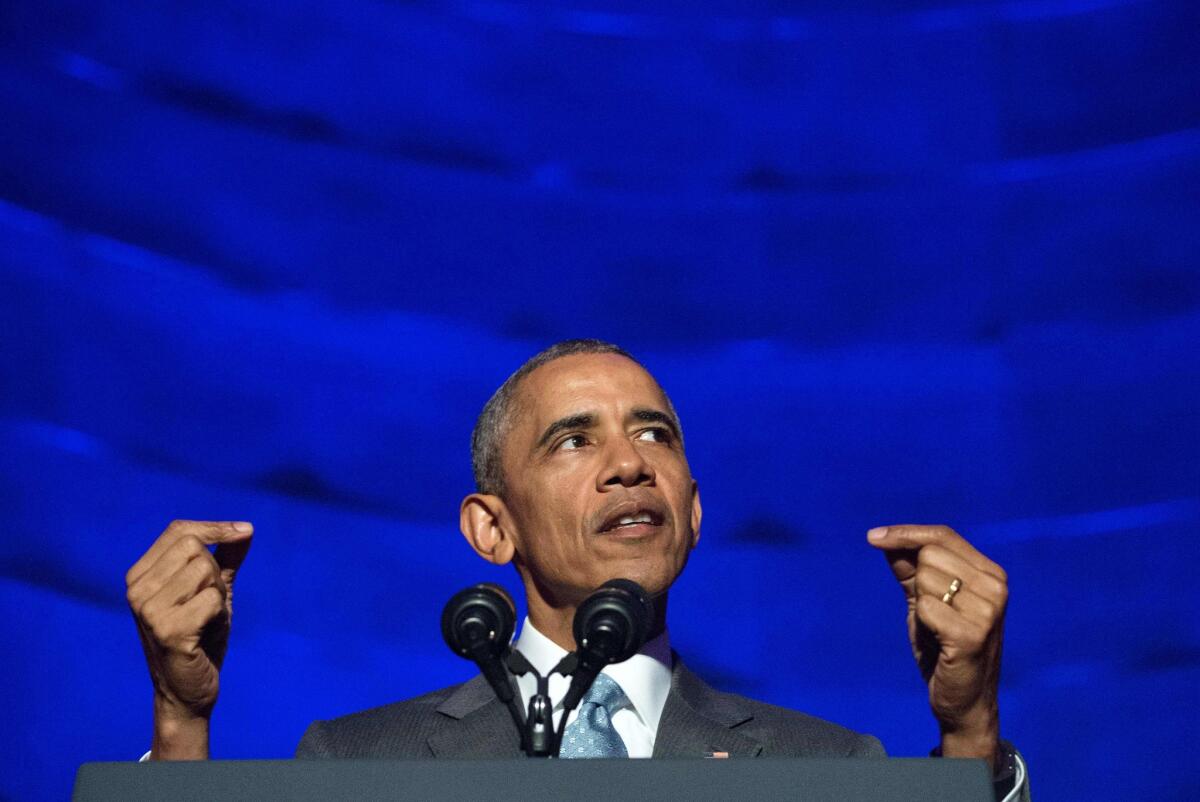Obama plays media critic, partly blaming the industry for ‘coarsening’ political debate

President Obama at a political journalism award ceremony at Syracuse University.
Reporting from WASHINGTON — President Obama challenged journalists to maintain high standards and rigorous scrutiny of political figures despite increased competition and the pressures of the smartphone age, warning of the cost to the nation’s democratic system if the press prioritized profit over the public good.
“When our elected officials and political campaigns become entirely untethered to reason and facts and analysis, when it doesn’t matter what’s true and what’s not, that makes it all but impossible for us to make good decisions on behalf of future generations,” the president said at a political journalism award ceremony Monday.
“A well-informed electorate depends on you, and our democracy depends on a well-informed electorate,” he added.
The speech at an event awarding the Toner Prize for Excellence in Political Reporting, awarded by Syracuse University to honor the late New York Times reporter Robin Toner, offered Obama another opportunity to reflect on the presidential campaign, as he laid some blame on the news industry for what he called the coarsening of the political debate.
Without naming Donald Trump, the political outsider whose domination of the airwaves preceded his amassing of a delegate lead in the GOP race, Obama again expressed dismay at “vulgar rhetoric” often targeting women and minorities, and called on journalists to do more to question the feasibility of candidates’ platforms.
“A job well done is about more than just handing someone a microphone,” he said, challenging reporters “to probe and to question and to dig deeper.”
Voters would be better served, he said, “if billions of dollars in free media came with serious accountability, especially when politicians issue unworkable plans or make promises they can’t keep.”
Obama acknowledged the pressures on the media industry and journalists specifically in trying to attract readers in the Internet era, but said the reaction should not be to “dumb down the news.”
A sensational story might get more hits online today, but “won’t stand up to the test of time,” he said.
“For all the sideshows in a political season, Americans are still hungry for the truth,” Obama argued. “It’s just hard to find. It’s hard to wade through. The curating function has diminished in this smartphone age. [But] people still want to know what’s true.”
The president also acknowledged some shortcomings on his part, saying that although he has not always agreed with constructive criticism of him in the press, he still valued “great journalism.”
“You should not underestimate the times I’ve read something that you did and I have called somebody up and said, ‘What’s going on here?’” he said.
But while he promised to lead the most transparent White House in history, a recent Associated Press review found his administration had set a record for failing to fulfill freedom of information requests. One in six such requests, 129,825 overall, resulted in no documents being provided, the review found.
Obama nonetheless encouraged reporters to keep up the difficult and oftentimes unglamorous work they do. In a year when Hollywood produced films about being stranded on Mars or battling grizzly bears, it was “Spotlight” -- a portrayal of the Boston Globe’s investigative reporting about the sex abuse scandal in the Catholic church -- that won an Academy Award.
“I’m not suggesting all of you are going to win Oscars. But I am saying it’s worth striving to win a Toner,” he said.
Follow @mikememoli for more White House coverage.
ALSO
Bernie Sanders has a plan to hijack Hillary Clinton’s superdelegates
Hillary Clinton says Republicans have only themselves to blame for Donald Trump
Petitioners want guns allowed at GOP convention, but it’s hard to tell if they’re serious
More to Read
Sign up for Essential California
The most important California stories and recommendations in your inbox every morning.
You may occasionally receive promotional content from the Los Angeles Times.











